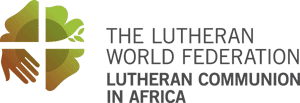Inclusive Community Resilience and Confronting Poverty in Africa

Lutheran Churches in Africa Strenghten Capacity on Confronting poverty and Economic injustice
Workshop hosted in Addis Ababa from 16th to 19th of October on the ongoing program of confronting and economic injustice in Africa was attended by the steering committee of the program chaired by Bishop Dr. Paul Finn coordinated the workshop.
“Poverty is not unsolvable” said Rev. Dr. Paul Fynn, the chairman of the Steering Committee for Confronting Poverty and Economic Injustice in Africa in his opening remark of the Inclusive Community Resilience and Confronting Poverty in Africa Workshop held at Friendship International Hotel in Addis Ababa, Ethiopia. Dr. Fynn further said that “God has never blessed poverty. Instead God has blessed the poor as an act of empowerment to heal them, reclaim their dignity, and make them come out of poverty”
Inclusive Community Resilience (ICR) and Combating Poverty in Africa Program was started in 2015 and many international organization have since widely used the approach. The approach recognizes the organizational capacities of poor communities being able to integrate their own resources and capabilities to address the challenges they are facing. ICR also offers a unique opportunity for church diaconal actors and the community they serve to plan social and physical infrastructure to better support their communities.
The Lutheran Council of Africa (LUCA) adopted ICR approach because it is defined in terms of communities and individuals harnessing local resources and expertise to help themselves come out of poverty. Following the increased number of member churches that are actively engaged in addressing issues of poverty and economic injustice in their local contexts, it became crucial that participants are trained on the ICR approach to go to their countries and train others,.
ICR Skills for networking within communities
The objectives of the workshop include improved skills of the ICR and Confronting Poverty and Economic Injustice in Africa program coming from an understanding of the thematic focus and requirements by diaconal actors, encouraging innovation, partnership and exchange of knowledge to strengthen networking within the communities, taking community priorities into consideration as a basis for Diakonia projects and for LUCCEA member churches to engage more in poverty reduction activities.
Training of participants from the various member churches to become TOTs was one of the approaches to reach at the objectives mentioned. The ToT focused on five significant topics which were covered by Dr. Belayneh Legesse, Associate Professor of Agricultural Economics in Haramaya University, Ethiopia. In the training, understanding the community in building ICR was the first topic discussed and it was indicated that defining a community from various perspective is important. Community refers to a set of interactions, human behaviors that have meaning and expectations between its members said Dr. Belayneh. To be more effective as a mobilizer, to empower or strengthen communities, knowing the nature of communities, and how they behave is important he added. Embracing diversity, innovation and creativity were spurred by differentiated insights and perspectives that are needed to tackle poverty. “We cannot talk about inclusive community resilience, without considering diversity which is very much inter-related with inclusiveness” said Dr. Belayneh when talking about the importance of entertaining different ideas, thoughts and gender to ensure equal opportunity to all. Community leadership in building ICR, building strong networks and support, and promoting learning and innovation in building ICR have thoroughly been discussed.
Participant from Kenya Evangelical Lutheran Church (KELC) urged churches to take action and start introducing new ways of doing things- modern farming – which can bring food security. When communities work together and accommodate new ideas, it can bring better life for the community, he added.
Participants’ engagements
A total of 32 diaconal workers from Tanzania, Kenya, Ethiopia, Senegal, DRC, Uganda, Eritrea, Madagascar, Rwanda, Ghana, Zimbabwe and Cameroon actively participated in the ToT. The training was accompanied with field visit to Berek Integrated Peri-urban and Rural Community Capacity Development Project which is run by the Ethiopian Evangelical Church Mekane Yesus Development and Social Services Commission (EECMY-DASSC).
The project benefits directly 660 households from which 416 are headed by female and the total number of persons benefiting are 3960 living in five kebeles with a main goal of contributing to the improvement of livelihoods of the target community.
The objective of the project is to create diversified livelihood for the community through improving income of the poor and enhancing their resilience. Most of the beneficiaries are poor women who are engaged in selling of leaves of Eucalyptus tree for subsistence of life of their families and they are vulnerable to all kinds of . After intervention of the project, most of the resilience capacity of these women enhanced and their livelihoods have been significantly improved as observed during the field visit and witnessed by the women themselves.
